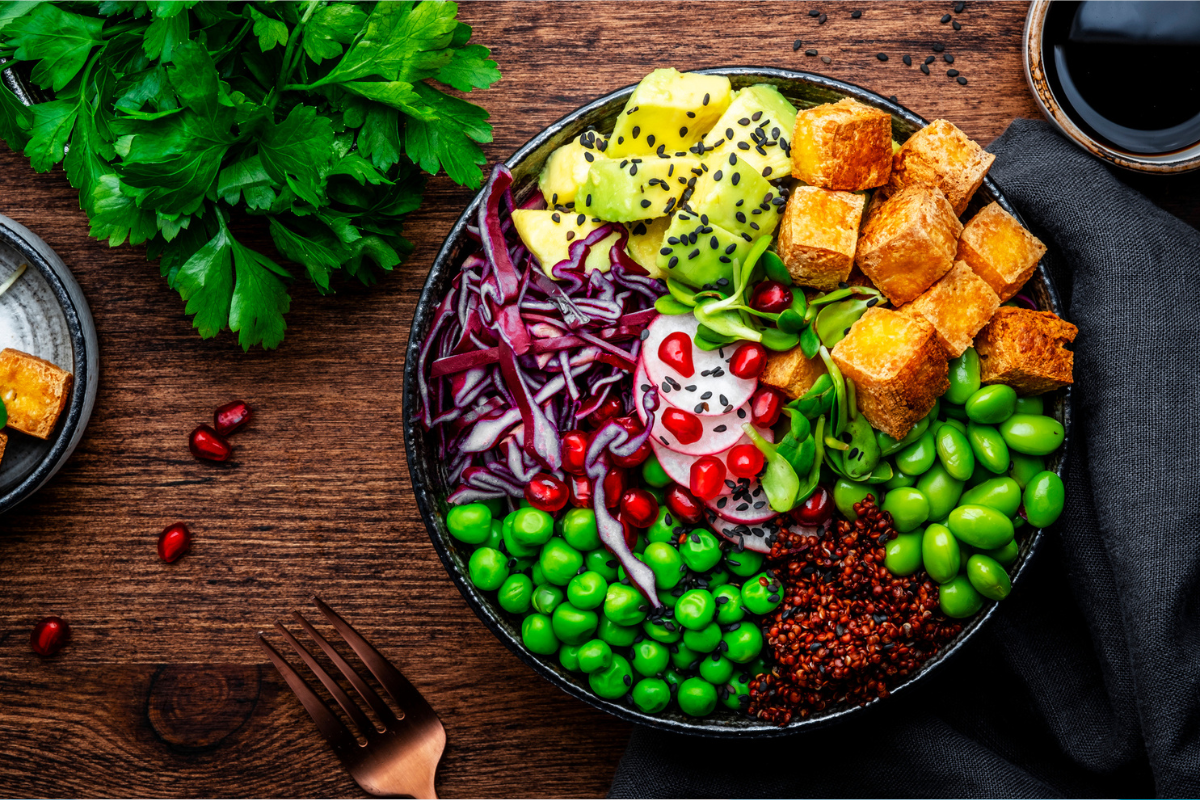From personalized nutrition and AI-powered tools to plant-based eating and fiber-packed diets, these 2025 trends offer an easy approach to healthy living. Discover the latest nutrition trends designed to help busy professionals optimize health and energy naturally.
1. Functional Foods and Beverages
Functional foods (those believed to support health benefits beyond basic nutrition) are becoming a core part of modern wellness routines, especially for busy professionals seeking efficiency in their health habits. These foods are being studied for their natural compounds that may support targeted aspects of health, such as brain function, immunity, digestion and stress response.
In 2025, the rise of adaptogens, nootropics and probiotics in everyday products like snacks, smoothies and even coffee is making it easier to integrate wellness into a fast-paced lifestyle. Adaptogens such as ashwagandha, rhodiola, and holy basil are being studied for use in regulating cortisol levels and improving the body’s resilience to stress—ideal for professionals managing high-pressure roles.
Some studies suggest that nootropics like lion’s mane mushrooms, L-theanine, and bacopa monnieri have potential to enhance memory, focus and cognitive clarity—providing a natural boost to productivity without the crash associated with caffeine or stimulants.
For professionals constantly juggling deadlines, meetings and personal life, functional foods offer a convenient way to improve health outcomes while staying fueled and focused throughout the day. The key is choosing high-quality products with science-backed ingredients and being mindful of how they fit into a balanced diet.
2. Simplified Eating Patterns
The “human kibble” trend emphasizes simplified, nutrient-dense meals. This approach involves consuming consistent, balanced meals, often in bowl formats combining proteins, grains, and vegetables – simplified, nutritionally complete meals that require minimal preparation or decision-making for busy professionals.
These meals are typically designed to hit macronutrient targets in one go, often blending high-quality proteins, whole grains, vegetables and healthy fats. The appeal lies in efficiency: grab-and-go nutrition that fuels productivity without compromising on health goals.
Proponents argue that these meals can reduce decision fatigue, save time and help ensure consistent nutrient intake—especially for those working long hours or juggling multiple responsibilities. For individuals who skip meals or rely heavily on takeout, these products may offer a healthier, more balanced alternative.
However, nutrition experts urge caution against relying too heavily on repetitive, formulaic eating. While convenient, a one-size-fits-all approach can lead to nutrient gaps over time if variety is lacking. Diverse diets are important not only for obtaining a broad spectrum of vitamins, minerals, and phytonutrients, but also for supporting gut health, maintaining enjoyment in eating, and fostering a sustainable, mindful relationship with food.
In essence, “human kibble” can be a practical tool in a busy person’s wellness toolkit—but it works best when used thoughtfully, with attention to ingredient quality, nutritional balance and dietary diversity throughout the week.
3. Emphasis on Fiber Intake
In recent years, dietary conversations have heavily emphasized protein—especially for those focused on energy, fitness and weight management. But in 2025, health experts are drawing attention to a long-overlooked yet essential nutrient: fiber. Despite its critical role in overall health, most Americans consume far less than the recommended daily amount (25 grams for women, 38 grams for men, according to the USDA).
Fiber, found in plant-based foods like fruits, vegetables, whole grains, legumes, nuts and seeds, is vital for maintaining digestive health, but its benefits extend well beyond regularity. A fiber-rich diet has been linked to a reduced risk of heart disease, type 2 diabetes, obesity and certain types of cancer. Soluble fiber (found in foods like oats, beans and apples) helps regulate blood sugar and cholesterol, while insoluble fiber (in foods like whole wheat, cauliflower and green beans) aids in digestion and prevents constipation.
For busy professionals, fiber can also be a secret weapon for sustained energy and satiety throughout the day. High-fiber foods slow the absorption of sugar into the bloodstream, reducing energy crashes and curbing unnecessary snacking—especially during long meetings or work-from-home stretches. Additionally, fiber supports gut health by feeding beneficial bacteria in the microbiome, which plays a growing role in mental health, immune function, and inflammation regulation.
*Always consult your health professionals before making any changes to your diet/nutrition.
Sources:
“Top 10 Nutrition Trends to Watch in 2025,” Nutrition for Non-Nutritionists.
“Top AI-Powered Nutrition Apps to Watch in 2025,” Tribe AI.
“Food and Nutrition Trends for 2025,” Chef for Hire.
“2025 Beverage Trends: The Year of Functional Recovery,” Intelligent Blends.
“Would You Eat ‘Human Kibble’? Dietitians Weigh In on the Viral Social Media Trend,” Health.com.
“People Kibble Trend Aims to Simplify Meal Prep and Nutrition,” CBS News.
“Dietary Fiber: Essential for a Healthy Diet,” Mayo Clinic.
“Why Is Fiber So Important?” Cleveland Clinic.
“How a High-Fiber Diet Can Help Prevent Cancer,” Memorial Sloan Kettering Cancer Center.
“A Top Nutrition Scientist Said People Should Focus More on Fiber Than Protein,” Business Insider.











